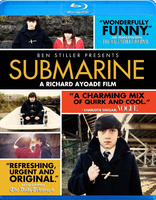Submarine Blu-ray Movie
HomeSubmarine Blu-ray Movie 
Starz / Anchor Bay | 2010 | 97 min | Rated R | Oct 04, 2011Movie rating
7.1 | / 10 |
Blu-ray rating
| Users | 0.0 | |
| Reviewer | 3.5 | |
| Overall | 3.5 |
Overview
Submarine (2010)
Fifteen-year-old Oliver Tate has two big ambitions: to save his parents' marriage via carefully plotted intervention and to lose his virginity before his next birthday. Worried that his mom is having an affair with New Age weirdo Graham, Oliver monitors his parents' sex life by charting the dimmer switch in their bedroom. He also forges suggestive love letters from his mom to dad.
Starring: Noah Taylor, Paddy Considine, Craig Roberts (IV), Yasmin Paige, Sally HawkinsDirector: Richard Ayoade
| Drama | Uncertain |
| Coming of age | Uncertain |
| Romance | Uncertain |
| Comedy | Uncertain |
Specifications
Video
Video codec: MPEG-4 AVC
Video resolution: 1080p
Aspect ratio: 1.85:1
Original aspect ratio: 1.85:1
Audio
English: DTS-HD Master Audio 5.1
Subtitles
English SDH, Spanish
Discs
25GB Blu-ray Disc
Single disc (1 BD)
Playback
Region A (C untested)
Review
Rating summary
| Movie | 3.5 | |
| Video | 4.0 | |
| Audio | 3.5 | |
| Extras | 1.5 | |
| Overall | 3.5 |
Submarine Blu-ray Movie Review
Irony Is Overrated
Reviewed by Michael Reuben October 4, 2011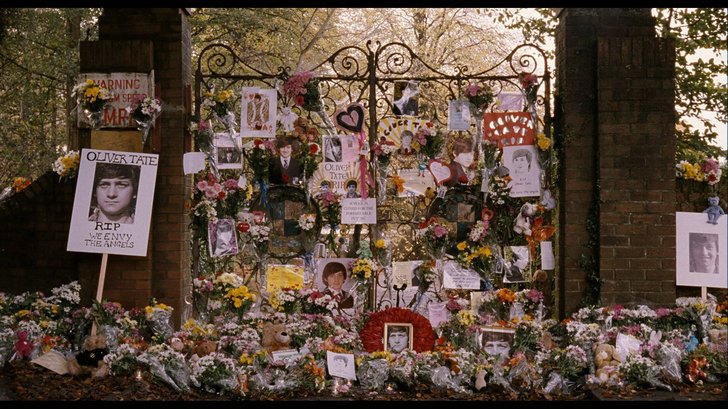
“I often imagine how people would react to my death.”
Submarine opens with a mock letter from Oliver (Craig Roberts) to his American audience that, among other things, thanks us for not invading Wales. I haven't been able to determine whether this opening appeared in the U.K. version, but it seems unlikely. Then again, a British audience might have enjoyed the irony, because they haven't invaded Wales either. (Or they might get ideas. You never know.) But if this addition was another of the Weinstein Company's marketing gimmicks after they picked up the film for U.S. distribution, then it was unfortunate, because it sets the wrong opening tone. Despite the desperate irony with which Oliver narrates the film (and which was used in the trailer to make it sound like a comedy), he's a sad kid, and not a very nice one. And the story that follows the letter may amuse at times, but it rarely provokes laughter. Oliver is the son of a depressive marine biologist, Lloyd Tate (Noah Taylor), and a brittle government employee, Jill (Sally Hawkins, who re-teamed with Roberts as mother and son in Jane Eyre). It's an increasingly distant marriage that Oliver monitors with concern, especially after a new neighbor moves in, Graham Purvis (Paddy Considine), who just happens to have been a high school crush of Jill's. Oliver's attention to his parents' lack of sexual chemistry is probably a side effect of his own raging hormones, which have locked onto a classmate, Jordana Bevan (Yasmin Paige), a girl who seems as hypnotic and mysterious to Oliver as an alien. In reality, Jordana is as much a kid as Oliver, and that becomes clear as the story unfolds, but Paige is wonderful at portraying the false maturity that some teenage girls are able to affect when they discover the power it gives them over boys. Unfortunately, Oliver's route to winning Jordana's favor involves joining the mainstream crowd of bullies who have targeted a fat girl, Zoe Preece (Lily McCann), and he does things he wouldn't otherwise do (and can't undo). In the short term, it's worth it. In later life? Who knows. Just as things are progressing with Jordana, the Graham Purvis situation becomes serious. The name "Purvis" is no doubt carefully chosen (just drop off the last syllable). Paddy Considine has played a wide assortment of roles, from the struggling immigrant father of In America to the religious fanatic of My Summer of Love to the phlegmatic police investigator of Red Riding: 1980. His Graham Purvis is one of those tricky performances balanced on an edge, in this case between comic and repugnant. Purvis is a self-help guru operating out of a brightly painted van adorned with his image. He gives classes and sells videotapes, and his method has something to do with colors and aura, but mostly it's about persuading susceptible women to have sex with him while he bellows and flings his mullet back and forth (like a ninja, in Oliver's eyes). He's enough of an exhibitionist to put on a show for the neighborhood with his current girlfriend, Kim-Lin (Gemma Chan), but he's clearly always on the prowl for someone new. After spending several evenings with Lloyd and Jill, his sights are set. And Oliver has to do . . . something. Submarine changes tone radically at this point, because the whole device of Oliver narrating his life and maintaining an ironic distance fits well with high school, but falls apart when his home life is threatened. Indeed, just as Oliver isn't prepared for the onslaught of real feeling that Graham Purvis' encroachment unleashes, the film doesn't develop a sufficiently effective technique to convey these feelings, and the narrative goes slack. We watch Oliver sabotage his budding relationship with Jordana, because he's so preoccupied with his home life. The presentation of these events is neither as lively as their bizarre courtship, nor is it moving. It's as if the film has settled into the same "down in the dumps" funk that routinely afflicts Oliver's dad, and while that may be a legitimate feeling to portray onscreen, you can't do so by replicating it in the viewer. I give away nothing by disclosing that Oliver does eventually drive off Graham Purvis. He accomplishes the job by doing what teenagers do best: making a mess, thereby instantly becoming the focus of his parents' attention (because they really do care about him). For someone like Purvis, it's easier to move on, because there are plenty of women, and Jill Tate is nothing special to him. Then Oliver has to return to high school and pick up the pieces of his adolescent existence, including dealing with the inconvenient fact of Jordana's new boyfriend and the burden of Too Much Information about his parents' sexual issues. By that point, though, Oliver's real predicament has finally come into focus. It isn't Jordana Brewster or Graham Purvis, whose names are the titles of the film's first and second "parts". It's the problem hinted at in Oliver's opening words:
Most people think of themselves as individuals, that there's no one on the planet like them. This thought motivates them to get out of bed in the morning, eat food and walk around like there's nothing wrong. My name is Oliver Tate.Oliver's greatest fear isn't losing Jordana to another boy or his mother to Purvis. It's that he isn't really Oliver Tate but Lloyd Tate. It's a fear of turning into his depressed, withdrawn, passive shadow of a father, who probably has (or once had) a narration much like Oliver's going on inside his head. Noah Taylor and Craig Roberts don't say much to each other in their scenes together as father and son, but they're effective in establishing the kind of wordless understanding that family members often have. Important visual cues (including posture, a robe and a mug) make the kinship even more obvious. The third "part" (or act) of the film is called "Showdown", and at first it appears to refer to Oliver vs. Graham Purvis. But it could just as easily apply to Oliver's confrontation with the paternal household ghost he rejects but feels himself becoming, and his determination that, if Lloyd won't fight for their family, then he will. Submarine was adapted from an autobiographical novel by Welsh author Joe Dunthorne. The writer and first-time director is English-born Richard Ayoade, whose heritage is Norwegian and Nigerian. The film's multi-cultural parentage is appropriate for a contemporary story with universal themes that nevertheless retains a specific sense of place, with its constantly overcast skies and lugubrious environment. Throughout the film, Oliver goes to the seashore and looks out, and that's where we leave him: gazing out at a vast unknown whose uncertainty he's just begun to grasp and faced with the choice of whether to risk exploring it or turn back to what he knows. It's not an easy decision, and there's more to it than he ever realized.
Submarine Blu-ray Movie, Video Quality 
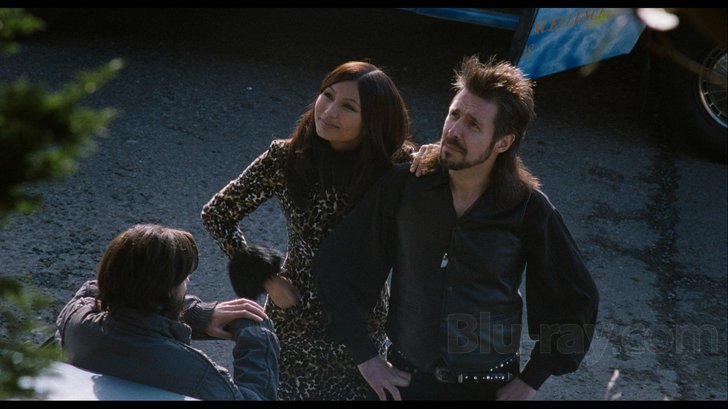
Like most contemporary films, Submarine was completed on a digital intermediate, which, absent exceptional circumstances, guarantees a clean source and an accurate transfer to Blu-ray. I saw the film theatrically just a few months ago, and Anchor Bay's 1080p, AVC-encoded transfer certainly does it justice. The cinematography by Erik Wilson (graduating to features from TV and second unit work) emphasizes the dull, desaturated palette of the overcast Welsh seaside, where the brightest color is typically Jordana's red jacket. (This turns out to be an important storytelling detail.) The image's black levels are good enough that detail is always discernible, even in a critical night sequence on the beach. The image isn't glossy, but it retains the texture of film without being intrusively grainy. Grain is still visible, especially in long shots of landscapes, and it looks natural and film-like. A few fantasy sequences were shot in Super8, and they're appropriately windowboxed; even they look good. I didn't encounter any DNR, compression artifacts or other digital anomalies.
Submarine Blu-ray Movie, Audio Quality 
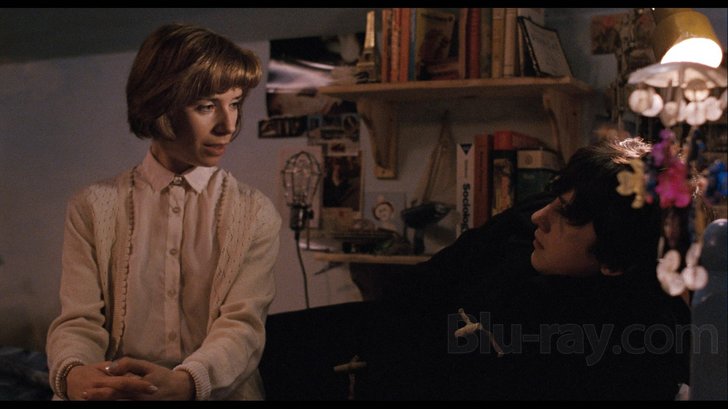
The DTS-HD MA 5.1 soundtrack is modest but effective. Although the seaside location would seem to present many possibilities, surround effects are limited to environmental ambiance. Dialogue is clear, but the regional accent may prompt American viewers to switch on the English subtitles from time to time. By far the best part of the track are the songs written and performed by Alex Turner, lead singer of the Arctic Monkeys, for whom director Ayoade directed music videos. They're moody and effective, with provocative lyrics, and they're beautifully suited to the film's tone. The instrumental score is credited to Andrew Hewitt.
Submarine Blu-ray Movie, Special Features and Extras 
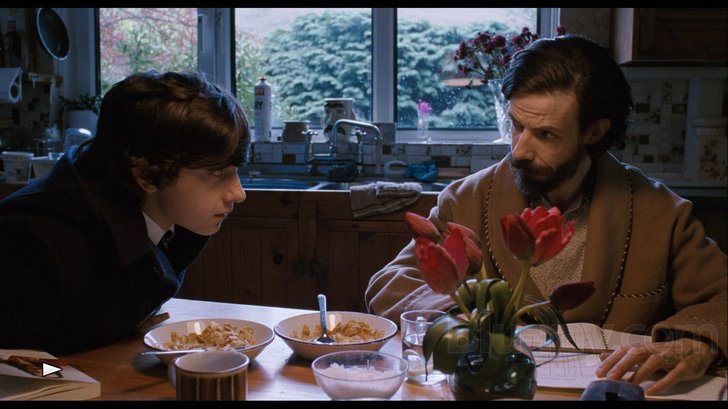
- Deleted and Extended Scenes (SD; 1.78:1, non-enhanced; 12:53): There are nine scenes. Many of them provide further exposure to the Graham Purvis "system", including his techniques for seducing attractive women.
- The Making of Submarine (SD; 1.78:1, enhanced; 10:57): Essentially an EPK, this featurette has the virtue of letting the lead actors talk at sufficient length to say something worthwhile about their characters. Director Ayoade discusses his interest in the novel and the production in general.
- Additional Trailers (HD): The film's trailer is not included. At startup, the disc plays trailers for Dirty Girl and Blue Valentine. The trailers (but not the introductory Weinstein Company logos) can be skipped with the chapter forward button, but are not otherwise available once the disc loads.
Submarine Blu-ray Movie, Overall Score and Recommendation 
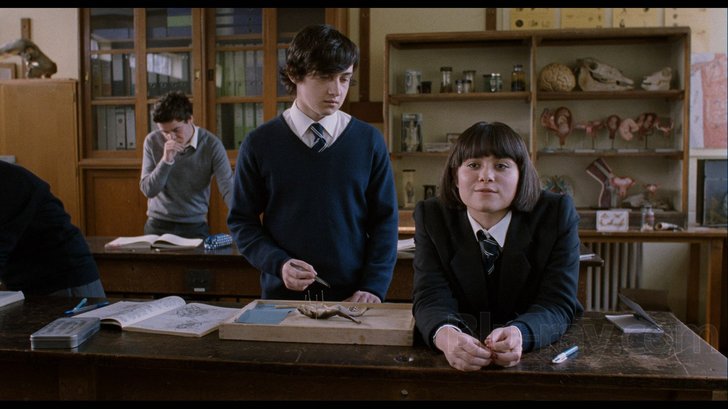
One of the executive producers of Submarine was Ben Stiller, who makes a cameo as the star of an American soap opera that appears briefly on a TV screen. One can understand Stiller's interest in the material, because Submarine explores the same areas of emotional discomfort that have inspired much of Stiller's best work. If the film isn't as dark or hopeless as Stiller's portrait of dysfunction and disconnection in Greenberg, it's mostly because Oliver Tate is still young enough and sufficiently unformed to have choices. He's certainly seen the possibilities. For starters, a submarine can either submerge, or it can surface. Submarine isn't without flaws, but it's an unusual film and worth your time, as long as you don't go in expecting a comedy. The Blu-ray is technically superior and recommended, despite limited extras.
Similar titles
Similar titles you might also like

Moonlight 4K
2016

Lady Bird
2017

Sing Street
2016

Lymelife
2008

Moonrise Kingdom
2012

Gregory's Girl
1981

Waves
2019

Boyhood
2014

Everybody Wants Some!!
2016

Mistress America
2015

The English Teacher
2013

Rushmore
Director's Cut
1998

The Fabelmans 4K
2022

Manhattan
The Woody Allen Collection
1979

Call Me by Your Name
2017

You Will Meet a Tall Dark Stranger
2010

Baby It's You
4K Restoration
1983

The Lords of Flatbush
1974

Mid90s
2018

(500) Days of Summer
2009
